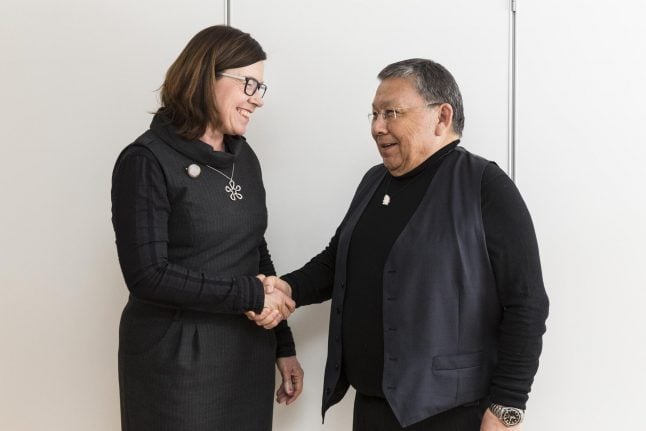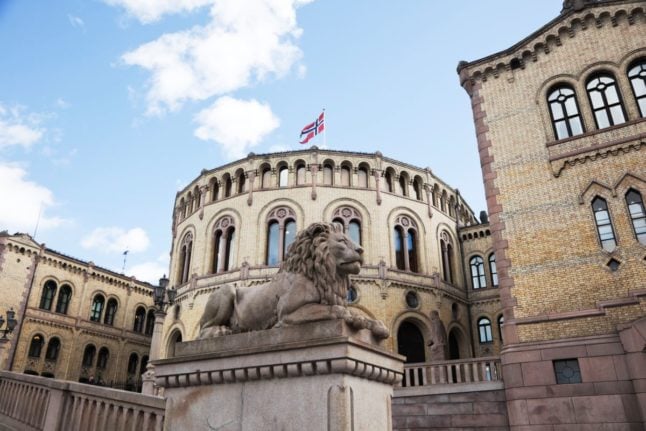Growing up on the Åland islands, the often roiling waters of the surrounding Baltic Sea were an ever-present backdrop for Britt Lundberg.
“We have always had a lot of seafarers – almost everyone who lives on the Åland Islands has relatives who work on the sea,” the 54-year-old politician explains.
But regardless of whether the seas were rough or tranquil, being surrounded by water meant that Lundberg and her fellow Nordic island dwellers were looking outward at the wider world that beckoned.
“We travel a lot and we know a lot about the world. We don’t see the sea around us as an obstacle or a border; we see it as a possibility to get somewhere. It links us to the rest of the world,” she adds.
‘If there’s a problem, you solve it’
These days, Lundberg finds herself linked to the world in a whole new way after having taken over as President of the Nordic Council in January 2017.
“The presidency of the Nordic Council rotates each year. I got asked if I wanted to represent Finland’s presidency in 2017 – and of course it’s a huge honour,” Lundberg says of her role with the inter-parliamentary body that coordinates cooperation between the Nordic countries.
Lundberg hopes to bring some Åland’s ‘can-do’ spirit to her work for the Nordic Council – a spirit that comes naturally to a place with fewer than 30,000 inhabitants, where influencing one’s own future may be easier compared to other places.
Furthermore, living in relative isolation also necessitates a certain degree of self-reliance.
 Photo: Magnus Fröderberg/norden.org
Photo: Magnus Fröderberg/norden.org
“We’re a small society, but hard-working. If you can’t find a job, you create one. It’s very common to own your own company here,” she says.
“Everything is possible – if there’s a problem, you solve it.”
Indeed Lundberg says she always knew she could influence her own future.
“You know from the beginning that you can choose how your tomorrow will look. In most families there is someone engaged in politics – it’s a part of our everyday lives,” she says. “It’s very common for your shop keeper, dentist, or local farmer to be a politician in the evenings.”
The accidental politician
And while political discussions were never far away, Lundberg’s foray into politics might not have happened if it hadn’t been for her love of singing – and her decision to become a mother.
“My start was rather odd,” she admits. “When I had children I was very fond of singing with them and going to different cultural events.”
At one such event, Lundberg – who dreamt of having a career as a journalist – was approached by a representative from a local church who encouraged her to get involved in a church election campaign.
“He was anxious that decisions made by the church would cut into the culture,” she explains. “There were a lot of elderly men making decisions there and he wanted someone to be there to help fight for culture and young people.”
Lundberg was intrigued.
“So I said, ‘Okay, I can try.’ And I did. And I got elected,” she recalls.
And just like that, the 30-something mother who loved to sing launched what has become a political career that’s spanned more than two decades, taking her from local politics, to the Åland parliament, and now to the Nordic Council.
While Lundberg still spends most of her time passing laws in Åland’s capital city of Mariehamn, she now also spends a lot of time coordinating with her Nordic Council colleagues in Copenhagen.
Read more Tales from the Top of the World
“I work every day with the presidency even if I am situated in the Åland islands and my main work is in the parliament here,” she says, adding it may seem “a bit strange” that part of her job is representing Finland even though she’s from autonomous Åland.
“But my Finnish colleagues asked me if I could represent Finland. So that’s kind of special and an extra honor,” she says.
Speaking with ‘one voice’
While Lundberg grew up in the Nordics, her new role has helped her appreciate even more how cooperation among Nordic Council members – Sweden, Denmark, Norway, Finland, Iceland, and the autonomous Nordic areas of the Faroe Islands, Greenland, and the Åland Islands – makes the region stronger.
“When you’re a bunch of small countries way up north in the world, it’s important to work together,” Lundberg says. “When we come together we have 26 million people – making us the 12th strongest economy in the world.”
Joining forces gives the Nordics an opportunity to be heard in places they otherwise might not.
“We can speak with one voice,” Lundberg says. “For example, in 2016 the leaders of the Nordic countries had a meeting in the White House with Obama – that wouldn’t have been possible if we acted individually.”
Lundberg points to the fate of her home of Åland as an example of what the Nordic spirit of cooperation can achieve.
In 1922 Åland officially became an autonomous Swedish-speaking region of Finland, maintaining its sovereignty and largely Swedish culture. The autonomy includes legislative powers covering a wide-range of areas that effect inhabitants’ every-day-life. Åland was also made officially neutral, and no nation is allowed to militarize the island.
 Photo: Magnus Fröderberg/norden.org
Photo: Magnus Fröderberg/norden.org
“Åland has a very strategic location in the middle of the Baltic Sea, and both Sweden and Finland were keen on getting it,” Lundberg says. “When this discussion became more heated, the question was passed to the newly-formed League of Nations – preventing what could have become a new war.”
Lundberg believes the resolution on Åland’s status proves that compromise can settle regional disputes concerning territory or minority rights peacefully.
“An autonomous region can exist within a country and still have its own language and culture,” she says. “There are solutions without war.”
Hope for the future: ‘A borderless North’
And it’s precisely that spirit of cooperation and peaceful problem-solving that has inspired Lundberg’s top priority while serving as Nordic Council President: creating what she calls a “borderless North”.
“For a very long time it has been important for the Nordics to integrate, to share our labour markets and education,” she explains. “Now people are moving more than ever, and we are working hard to be the world’s most integrated area.”
If a Nordic citizen wants to move to another Nordic country, the process is already relatively simple – the Nordic Passport Union of the 1950s allows citizens to travel and reside in other Nordic countries without a passport or residence permit.
“But there are still challenges – such as problems with pensions, or education credentials which aren’t automatically accepted,” Lundberg explains. “There are also problems with various branches. For example, the qualifications for electricians are different.”
In the Nordic Council’s next session with the Nordic prime ministers this autumn, Nordic Freedom of Movement will be at the top of the agenda.
“This is something we are working hard on, and the prime ministers will tell us what they have done to improve the situation and reach this freedom. We must trust each other – to become the most integrated region of the world.”
Click here to discover more Nordic stories
This article was produced by The Local Client Studio and sponsored by the Nordic Council of Ministers.



 Please whitelist us to continue reading.
Please whitelist us to continue reading.